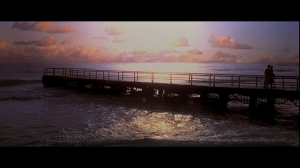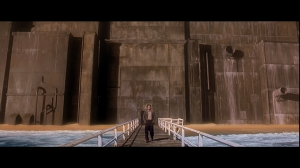
Rating: 3.5 stars (out of 4)
I’ll assume whoever reads this has seen The Matrix. According to IMDb, it’s not only one of the most beloved movies of this generation, but one of the most widely seen. If you haven’t seen it, you’re in for a treat; though Keanu Reeves’ acting is a bit stiff, and there are parts of the script I’m skeptical about, it’s one of the most exciting sci-fi movies ever released.
The key word there is “exciting.” It’s not the same as “good.” Just to clarify, I do think the Matrix is a GOOD movie. In fact, a GREAT one. But there are other things a movie can do besides get the blood pumping.
One movie it’s easy to compare The Matrix to is Dark City, which you’re much less likely to have seen. It came out one year before the Matrix and was directed by Alex Proyas. The two films tell basically the same story but in very different styles. (For the record, I don’t believe that The Matrix stole anything from Dark City — as is often accused by Dark City fans — as The Matrix was probably well in to production by the time Dark City came out.)
Dark City is a tremendous film. As soon as I saw it the first time, I wanted to see it again. As soon as I saw it the second time, I still wanted to see it again; but in the name of saving time I decided just to skip around the DVD and visit my favorite parts. Though I don’t hold it as close to my heart as I do The Matrix, I think it holds its own and, by many measurements, is a “better” movie than The Wachowski’s film.
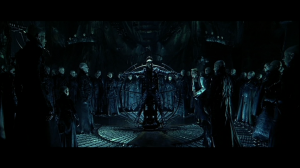
If film study terms like “deep focus” mean anything to you, then you’ll probably find a lot to love in Dark City. The designs seem largely based on expressionism, with sharp angles and exaggerated images filling the screen. This melds with a distinct noir-feel and strange sets that feel like they’re stuck straddling the Double Indemnity and Twelve Monkeys.
Even if the previous paragraph means almost nothing to you, you’ll get sucked in by the movie’s brooding story and haunting visuals. We viewers can detect from the start that there’s something artificial about the world, but the way that set-up unfolds is absolutely fascinating and, at times, thrilling. Dark City is old-fashioned, and its CGI is about a tenth as convincing as The Matrix’s, yet attentive film-making and a good story — which Dark Story has in bushels — are always rewarding.
There are scenes in this film that are beautifully shot, and it’s not just the major set pieces. Some of the most complicated, detailed shots are only on screen for a second or two and do something simple, like establish that a character is walking somewhere or sitting in a room.
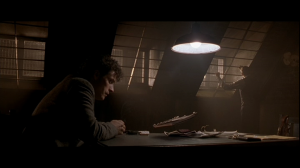
Dark City also digs deeper into its underlying thematic questions than The Matrix. At times when I’m watching The Matrix, I feel like the characters are spouting philosophical mumbo-jumbo. In Dark City, the characters actually talk like you’d expect someone in a fake world to talk. The revelations don’t come one after another in rapid-fire, so they feel earned.
Another treat for film fans will be how reverently Dark City references old crime and sci-fi films. My relatively untrained eye caught references to at least a half dozen films I’ve seen, all of which were integrated to the film scrupulously.
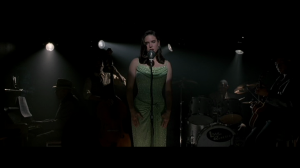
One last reason to watch the film is that it has a Roger Ebert commentary along with a commentary by the director and several members of production. I listened to most of Ebert’s commentary, and it lives to up his reputation for absolutely phenomenal insight and attention to detail.
The movie’s not without flaws. I’m not a fan of how memories and minds are depicted as simple devices. I also think Kiefer Sutherland’s performance is too exaggerated. His weird vocal tics get old fast and distracted me as the movie was advancing the plot several times. The effects are also shockingly inferior to other high-budget films. These complaints all end up being minor; by the time the stunning, ambiguous ending rolled around, I had forgotten any sentiment besides appreciation for Dark City.
I recommend Dark City to just about anyone. I won’t guarantee you’ll enjoy it as much as The Matrix (I certianly didn’t). But if you enjoy thoughtful, quieter movies and pay close attention to it, it might compete.


